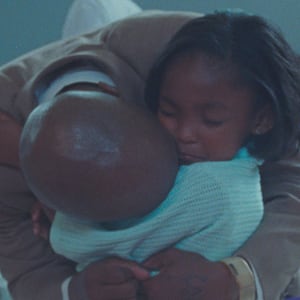Reams of data exist that highlight the range of effects a father’s absence can have on his daughters. They’re likely to struggle with trust issues. Their confidence might flag. They may wrestle with feelings of abandonment, low self-esteem, and rejection, or develop aggressive or otherwise antisocial behaviors, or risk-taking behaviors; they may become depressed, detached, or anxious. Fathers shape their daughters’ relational lives—the foundation and maintenance of meaningful relationships, with family, with friends, with romantic partners, with communities—and spur their creativity.
Angela Patton and Natalie Rae’s Daughters, the Festival Favorite and Audience Choice: U.S. Documentary Competition winner at this year’s Sundance Film Festival—now available to watch on Netflix—side steps statistical analysis and instead strives for emotional impact.
I have two daughters myself. For their privacy’s sake, I’ll refer to them by their nicknames: Brontosaurus, my eldest, and Elephant, my youngest. I love them more than anything I’ve loved in my forty years on this Earth.
On behalf of that, I intentionally avoided Daughters in my remote coverage of Sundance, knowing full well a movie with that title, focused on the subject of barriers forced between young girls and their incarcerated dads, would likely break me in two; the idea of being separated from my girls is the stuff of my nightmares, as unlikely as it is that we’ll ever be separated. (Sending them off to summer camp and, soon, back to school is hard enough.) I am not a statistic. Brownie and Elephant aren’t, either. All the same, my reality didn’t blunt Daughters’ effect on me.

A photo still from Daughters
Courtesy of NetflixThis is not a film about the numbers: How many girls grow up fatherless in the U.S.; how many of those girls end up in bad partnerships; how many of them become teen mothers; how many are burdened by mental health problems; how many attempt suicide. Frankly, that wouldn’t be a film at all, had Patton and Rae chosen these details as their subject. It would be an academic paper instead, dry and sans any human sensation.
Sensation is what Daughters is all about, of course, a front row seat to an overwhelming reconnection between a cadre of girls and their fathers, each behind bars for reasons Patton and Rae refuse to detail. (Those reasons are neither our business nor relevant to the film’s thesis.). At the same time, it’s an elegant condemnation of America’s love affair with crime and punishment, exhibited through varied atrocities carried out within its prison system.
Daughters declines to editorialize. The atrocities on the inmates occupying the facility Patton and Rae have chosen as their setting all speak for themselves. Being in prison is one thing. Being denied the luxury of touch during a scheduled visitation is another. Daughters notes a contemporary shift in prison operations, away from in-person interaction between inmates and their families, and toward a paid video call system—one modern day iniquity among countless others.
But the film’s establishment of humanitarian sins against these prisoners isn’t just about revealing the corrupt soul of America’s “lock-’em-up” mindset. It’s about identifying the punishment these sins wind up indirectly inflicting on children of incarcerated parents, specifically focused on father-daughter bonds.
Displaying unfailing empathy, Daughters poses a series of questions to its audience, to spur compassionate thought about carceral society: Is it not enough to lock these men up? Is it not enough that they’re forfeiting time off of their lives as restitution for breaking laws? Why should their kids suffer additional consequences, too? What laws did they break?

A photo still from Daughters
Courtesy of NetflixBy Patton and Rae’s grace as filmmakers, Daughters plays with observational bluntness. This is not a Christian Children’s Fund PSA. This is an intimate, unvarnished glimpse at what happens to girls who live each day knowing their father is out of their reach behind 12 feet of ASTM-approved fencing—how their shine dulls without him around, who they become while they wait out the years until his release.
In some cases, the release comes. In others, it’s extended to truly jaw-dropping passages of time. Aubrey, a prototypically precocious 5 year old, makes optimistic rationalizations about how her father Keith’s 7 year sentence isn’t so bad; seven is a small number, which she demonstrates using hand gestures representing revolutions of the sun. Seven revolutions. Seven years. That’s doable. Bless this sweet child, though: She can’t fully wrap her head around the dark side of the math, how that comparatively short seven-year period means he won’t be in her life for those seven years.
Other girls, like 10 year old Santana and 11 year old Ja’Ana, better understand the toll the years will take, because they’re already taking their toll. Santana is her family’s de facto “dad,” helping raise her younger sister and brother. The world shouldn’t be this way.
For a brief moment, beginning at Daughters’ halfway point, it isn’t this way. Leading into its midsection, the fathers undergo intensive therapy through the Date With Dad program, designed to help calcify their relationships with their daughters while also imparting on them skills to facilitate their reentry into the free world. (According to a title card preceding the credits, a whopping 95 percent of fathers in the program stay out of jail after serving their sentences. If this is not proof enough that the American penal system is a lumbering, ineffectual disgrace that perpetuates crime rather than solve it, nothing ever will be.)
Before long, they have finished the program, donned their suits and ties, slipped into their dress shoes, and filed into a long hallway where they wait for their daughters, their angels, their saving graces, who concurrently have been getting ready themselves, putting on bright, shining dresses, styling their hair, delicately applying makeup, and then, finally, the moment culminates in their arrival at the jail, and the swift, joyful rush into their dads’ arms, a tearful ebullient rapture, no witness to which will be left unmoved.
It’s impossible to miss the cruel parallels between this culminating moment and the mundanities of childrearing. Think about pickup from daycare or kindergarten. Think about your child barreling toward you for a hug, squealing your name like a delighted battlecry, a daily routine for me when I grab my two littles at the end of the day. Watching Daughters’ arrive at its climactic beat, for me, meant revisiting that routine, and feeling a flood of gratitude that I experience that every weekday, coupled with a surge of grief for Patton and Rae’s participants, who only get to experience it now, in this one flash of time, and then have to hang onto it through the years to come, until they get out, assuming they do, and return to their families.

A photo still from Daughters
Courtesy of NetflixI am no statistician. I do not set foot in the playgrounds of data outside my purview as a film critic, though that being said, I can’t tell you who Daughters’ likeliest audience is. I can only say that it should be “everyone with a Netflix account.” But it especially should include fathers of daughters, whatever their background, status, circumstance, 0r odds of one day ending up in jail themselves.
Daughters inserts itself in a moment contained within America’s long history of jailing Black men, something I know enough about to guess that the sentences received by these men are blatantly unfair. The gross injustice of their situations, however, provide valuable catharsis for those of us privileged enough, fortunate enough, to enjoy our American freedoms, and most of all to enjoy being in our daughters’ lives. From the start of the Daddy Daughter Dance to its heartbreaking finish, these men aren’t prisoners. They’re dads again. They are as free as anyone in prison can be, because they are with their girls, and their girls get to be daughters again.
The tragedy inherent in the reunions Daughters captures with such tenderness is a reminder to dads: Cherish your daughters. As you watch the second half of Patton and Rae’s work through sobs and choked breath, remember how much they need you. Remember how much you need them.









